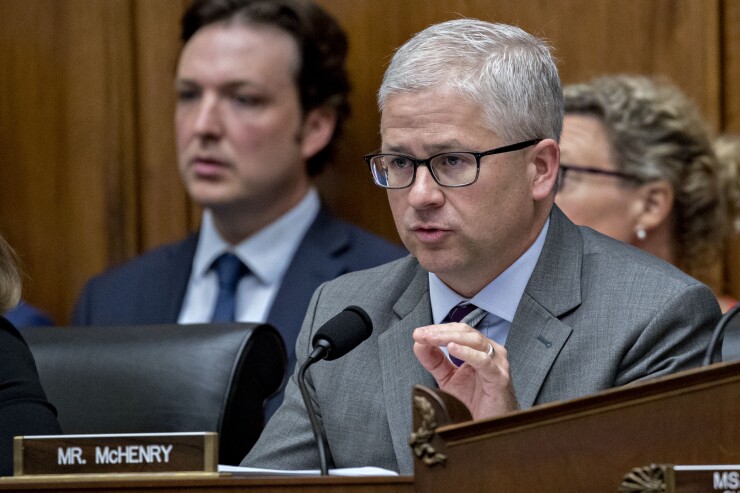
WASHINGTON — Republicans members of the House Financial Services Committee — including committee Chair Patrick McHenry. R-N.C. — sent a letter to federal regulators supporting innovation in bank-fintech partnerships and urging them to look to state regulators for guidance.
In
"Given fintech's evolving nature and promising potential to enhance our financial system, it is essential that these newer products and services are not treated with undue regulatory scrutiny, which will only lead to stifling innovation," they said. "Regulation and supervision should be appropriately scaled to address the nature of the partnership, not a one-size-fits-all approach."
The letter further called on regulators to incorporate the experiences of state regulators in any future regulation and held up the benefits of having individual states try different approaches to regulating fintechs. Treasury Under Secretary for Domestic Finance Nellie Liang
"Communication with state banking regulators should be strengthened. More often than not, it is state regulators who charter many fintech partner banks," the letter noted. "Their insights are critical during the examination process having been on the frontline of innovation [and] regulators can learn from their approach to safety, soundness, and consumer protection, including through the creation of regulatory sandboxes at both the state and federal level."
The letter responds to regulators' joint release and accompanying
Regulators have increasingly warned financial institutions of the risks of bank-fintech partnerships after the high-profile bankruptcy of fintech middleware provider Synapse in April
Regulators remain particularly concerned about the nebulous nature of liability in BaaS relationships in the event of a fintech failure. The agencies say banks must take the lead and are ultimately on the hook for holding partners accountable to bank regulators requirements, including by vetting and closely monitoring fintech partners to ensure they have met risk management and consumer protection standards. Federal bank regulators are particularly concerned about consumer confusion over representations of FDIC insurance coverage, which only applies to bank deposits and not fintechs.
The lawmakers' letter argues for regulators to remain technology neutral in their evaluation of such partnerships and to weigh their benefits alongside their risks. The letter notes fintech partnerships can help expand consumer access to affordable financial products, foster competition by enabling smaller local firms to broaden their reach and attract diverse, digitally focused customers through tailored product offerings.
"There are many different types of bank-fintech partnerships with varying complexities," the lawmakers wrote. "Consumers should be afforded the same protections they are afforded under existing law, regardless of how they access financial services."
The lawmakers also expressed disapproval with the FDIC's move to reclassify many deposit arrangements — which are in some cases facilitated by fintech partners — as "brokered," a classification which hamstrings which kinds of banks may accept such deposits.
"Heavy-handed and unclear examinations of fintech partner banks, ill-fitting regulatory treatment of blockchain technology used by financial institutions, and the FDIC's flawed brokered deposits proposal will not protect consumers or the financial system," they wrote. "Regulators should allow responsible innovation to better serve our constituents and the financial system more broadly."






